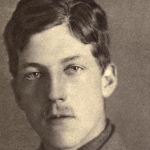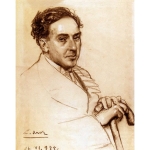All the hills and vales along
Earth is bursting into song,
And the singers are the chaps
Who are going to die perhaps.
O sing, marching men,
Till the valleys ring again.
Give your gladness to earth’s keeping,
So be glad, when you are sleeping.
Cast away regret and rue,
Think what you are marching to.
Little live, great pass.
Jesus Christ and Barabbas
Were found the same day.
This died, that went his way.
So sing with joyful breath,
For why, you are going to death.
Teeming earth will surely store
All the gladness that you pour.
Earth that never doubts nor fears,
Earth that knows of death, not tears,
Earth that bore with joyful ease
Hemlock for Socrates,
Earth that blossomed and was glad
‘Neath the cross that Christ had,
Shall rejoice and blossom too
When the bullet reaches you.
Wherefore, men marching
On the road to death, sing!
Pour your gladness on earth’s head,
So be merry, so be dead.
From the hills and valleys earth
Shouts back the sound of mirth,
Tramp of feet and lilt of song
Ringing all the road along.
All the music of their going,
Ringing swinging glad song-throwing,
Earth will echo still, when foot
Lies numb and voice mute.
On, marching men, on
To the gates of death with song.
Sow your gladness for earth’s reaping,
So you may be glad, though sleeping.
Strew your gladness on earth’s bed,
So be merry, so be dead.




















Comment form: